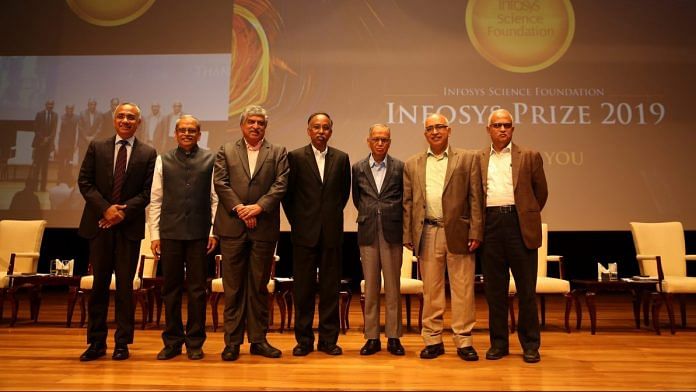New Delhi: The Infosys Science Foundation (ISF) Thursday announced the winners of the Infosys Prize 2019 in six categories, including engineering and computer sciences, humanities, life sciences, mathematical sciences, physical sciences and social sciences.
From a critical reinterpretation of South India’s cultural history to designing tools and pioneering work on data mining, the 11th Infosys Prize honoured groundbreaking research in diverse fields. The prize for each category comprises a gold medal, a citation and a tax-free award of $100,000 (around Rs 70 lakh) this year.
The awardees were selected from 196 nominations by a panel of six jurors.
“We should start helping our youngsters pursue fundamental research enthusiastically. They should be encouraged and equipped to become contributors to solving huge problems that confront us every day. I want India to be a place where discovery and invention happen every month,” Infosys founder N. R. Narayana Murthy said at the event.
Sunita Sarawagi, a professor at the Indian Institute of Technology (IIT), Bombay, won the Infosys Prize 2019 in the engineering and computer science category for her research in databases, data mining, machine learning and natural language processing, as well as for important applications of these research techniques.
The prize recognises her pioneering work in developing information-extraction techniques for unstructured data – information that doesn’t have a pre-defined data model or not organised in a pre-defined manner. The techniques developed by Sarawagi has practical applications in cleaning up unstructured data such as addresses on the web and in repositories, which in turn helps to efficiently handle search queries.
“The Infosys Prize continues to recognize exemplary work in scientific research and enquiry. Many Infosys Prize laureates have gone on to contribute significantly in key areas like healthcare, genetics, climate science, astronomy and poverty alleviation, amongst other things. Their work has immediate implications for the human race and the planet. We hope it catalyzes social development,” said S.D. Shibulal, co-founder, Infosys Limited and President of the Infosys Science Foundation.
Also read: India prepares hard for global student assessment test — last time it finished in bottom two
Reinterpreting conventional wisdom
Manu V. Devadevan, an assistant professor at the IIT- Mandi, was awarded in the humanities category for his original and wide-ranging work on pre-modern South India. He has critically reinterpreted conventional wisdom on the cultural, religious and social history of the Deccan and South India.
Devadevan’s primary research interests include political and economic processes in pre-modern South India, literary practices in South India and the study of ancient inscriptions from the region.
In the category of life sciences, the award was given to Manjula Reddy, chief scientist at the Centre for Cellular and Molecular Biology in Hyderabad, for her discoveries concerning the structure of bacteria cell walls. Her team has revealed critical steps of cell wall growth that are fundamental for understanding bacterial biology. This work could potentially help in creating a new class of medicines to combat antibiotic-resistant microbes.
Siddhartha Mishra, a professor at ETH Zurich, was awarded in the mathematical sciences category for his outstanding contributions to applied mathematics, particularly for designing numerical tools.
Mishra’s work has been used in climate models, in astrophysics, aerodynamics, and plasma physics. He has produced codes for complicated realistic problems such as tsunamis generated by rock slides, and waves in the solar atmosphere.
Work on ethics, ‘self-hood’ and creative process
G. Mugesh, a professor at the Indian Institute of Science (IISc), Bengaluru, received the award in the physical sciences category for his seminal work in chemical synthesis of small molecules and nanomaterials for biomedical applications.
His work has contributed in the understanding of the role of trace elements such as selenium and iodine in thyroid hormone activation and metabolism, and this research has led to major medical advances.
In the social sciences section, Anand Pandian, a professor at the Johns Hopkins University, US, was awarded for his work on ethics, ‘self-hood’ and the creative process.
Pandian’s research encompasses several themes such as cinema, public culture, ecology, nature and the theory and methods of anthropology. His writing pushes the boundaries of how anthropologists render into words the worlds they encounter.
Disclosure: Infosys Chairman Nandan Nilekani and Co-founder N.R. Narayana Murthy are among the distinguished founder-investors of ThePrint. Please click here for details on investors.
Also read: At least 28 pieces of debris from India’s A-SAT missile test still floating in space



